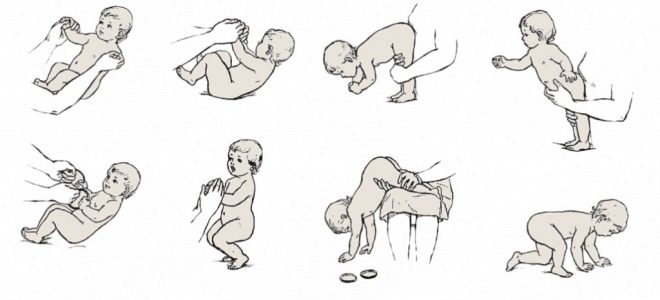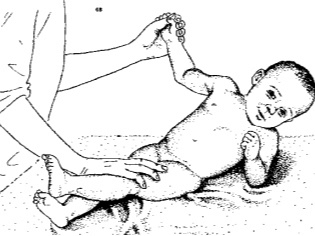How many months do boys usually start sitting?
Mothers of boys often believe that sons can sit down earlier than girls. This is explained by the features of the structure of the reproductive system. At the same time, there is a different opinion, which says that boys are more lazy and noticeably behind in their development time from their peers.
Is there any difference?
No matter how hard the girls' mothers tried to convince others that their daughters do everything earlier and faster, or the mothers of the boys were worried about this, in reality there is no dependence of the developmental period on the sex of the toddler. Therefore, pediatricians are unanimous - there is no difference between boys and girls in mastering the skill.
Therefore, the boys begin to adopt a new position in space at about the same time as their small peers do. The age of mastering the skill is on average 6 to 9 months. Such a significant variation is due to the complexity of the ability to sit.
A boy (and a girl) sits down when he has rather well developed abdominal, back, arm, neck muscles. Gender development of these muscle groups is irrelevant.
The statements about laziness, awkwardness and some inhibition of the small representatives of the stronger sex also have no justifications.
You can, of course, take into account that boys generally weigh more than girls, but the difference in weight is not so great that children develop at a different pace during the first year of life.
Terms and stages of mastering the skill
There is no single age for boys in which they must learn to sit. It is believed that the child can theoretically begin to take the first attempts to sit down with the support on one arm from 5-6 months, but this question is purely individual - it all depends on the degree of muscle development, on their tone, on how well the child has learned to turn over and hold head
The speed of the development of the skill affects the weight of the baby - "heroes" are trying to sit down later than thin "lightweight". The temperament of the boy is important: phlegmatic and melancholic reluctantly go for experiments, so later they start to sit down, and choleric and sanguine people readily learn new movements, because they are interested in everything, unlike the first two temperaments, which are more interested in tasty food and sound sleep.
If the boy is constantly in the crib, and continue to swaddle him, then with a high degree of probability the child will start to sit later than the rest. To learn new things, babies need a certain habitat, implying a space much larger than the size of the crib or playpen, and you also need to have the motivation to sit down.
You should not expect from a boy who was born prematurely, an early landing. Its muscle and bone tissue is much less ready for new loads than the body of children born healthy and on time. Painful and weakened children also learn to sit later.
Before you sit down, the baby will demonstrate in every way the willingness to do so. Attentive parents can not miss it. He will actively spin and roll, trying to raise the body with the support on his hands. After this begins the stage of short-term sitting. With her, the child can sit on the ass, but can not hold the weight for a long time and balance, and therefore falls.
After 1.5-2 months from the beginning of the short-term sitting stage, the boy will be able to sit down more easily and even keep his own weight for a short time.From this age you can sit with support.
For a start, the hands of the parents can be used as a supporting factor, so the baby will learn to lean on the arm or the elbow. In this period, boys usually do not stay long, because only one hand remains free, and two are needed to understand the world. There is an incentive to stop leaning and learn to sit without support. At this stage, the child often develops support on four limbs and “gets stuck” for a long time in this position - he can stand in it, sway, but he does not want to sit down or crawl.
By 8 months, up to 90% of boys can sit without support. By 9 months, the child begins not only to sit on his own rather confidently, but also tries to learn how to sit down from a prone position. It is usually given with difficulty.
From what age do you need to sit down sons?
The all-knowing popular rumor says that, in principle, mothers of boys are in no danger if they sit down their son, relying on their own body, almost from a newborn age. There is also an opinion that by 3-4 months it is necessary to put a male child on a highchair or in a stroller with seat-belt support. These tips are harmful and dangerous.
Moms of boys need to sit down their children when they are ready for this, but not before six months. Early planting, according to pediatricians, can adversely affect the health of the spine, joints, bones, limbs can be deformed, in the future the child is threatened not only by exemption from military service, but also, possibly, by disability. A broken posture and gait - this is only the tip of the iceberg.
It is better to wait for the period when the child himself begins to express a desire to change the position of the body.
Opinion of Dr. Komarovsky
A well-known children's doctor and TV presenter Yevgeny Komarovsky argues that the child does not need the help of parents in terms of learning to sit. Everything should happen in the timeframe that Mother Nature has provided for the particular child.
If you really want to do at least something for the child, Komarovsky advises to perform a general strengthening massage and gymnastics, walk more and completely eliminate the child's stay in the jumpers. These devices are unnatural - a baby who has not learned to sit should not be in an upright position. Jumping is the path to spinal injuries and hip joints.
The opinion of Dr. Komarovsky about when the child begins to sit, see below.



















